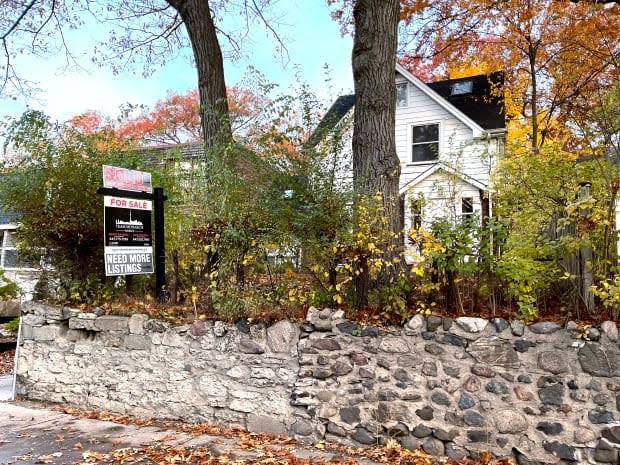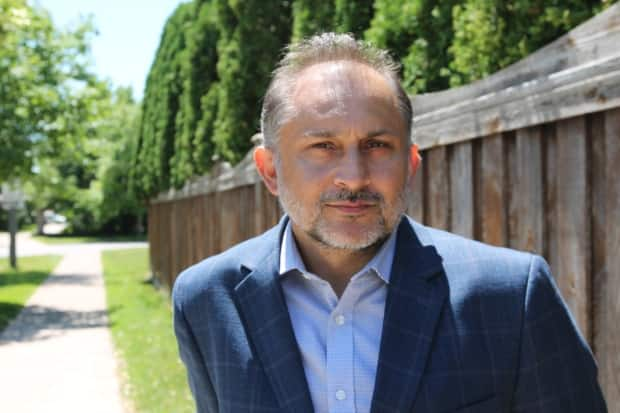Toronto councillor pushes for speculation tax to cool 'insanity' of escalating real estate prices

As real estate prices soar across Ontario, a Toronto city councillor is about to introduce a motion asking the provincial government to bring in a speculation tax aimed at putting a chill into the red-hot housing market.
Mike Colle, who represents Ward 8, Eglinton–Lawrence, told CBC News he'll make the move when city council meets later this month.
"$1.3 million for a starter home in Toronto. This is insanity," said Colle. "I'm asking the province to look at this as a way of slowing things down and ensuring that reasonable people with reasonable incomes have a chance at a house."
The Toronto Regional Real Estate Board reported last week that the average selling price for all home types combined rose by 21.7 per cent year-over-year to $1,163,323.

As CBC News recently reported, investors now make up the largest segment of home buyers in Ontario; 25 per cent of homes are being snapped up by investors speculating that prices will only keep rising.
Colle is calling on the Ontario government to introduce a speculation tax on the sale of homes that are not principal residences to deter speculators and what he calls "home flippers."
It wouldn't be the first time a tax like this was introduced in Ontario. The Bill Davis government brought in a speculation tax in the 1970s to cool Ontario's real estate market.
While some experts say the province needs to address sky-high prices that have outpaced incomes, they caution such a tax could have an "aggressive" impact. They further say the rate of the tax and how it's implemented are crucial.
Others warn it could crash the market and that any measure to deter investors could have unintended consequences.
'Blowing up the market'
Ontario already has a 15-per-cent non-resident speculation tax that applies when foreign corporations, or individuals who are not citizens or permanent residents of Canada, purchase or acquire property located in the Greater Golden Horseshoe Region.
Colle doesn't say how high he believes the proposed tax should be, but he's calling for a broader levy that would also target domestic investors who buy or flip multiple homes, treating housing like a "bitcoin-type commodity."
"We're talking about people that are in the buying and flipping of houses and condos for their income," said Colle.
"These people are just essentially blowing up the market in Toronto.… There are other factors, but this is one factor that I want the provincial government to wake up and look at."
WATCH | The Canadian Real Estate Association reports double-digit increases this fall
The Bank of Canada recently acknowledged for the first time that a sudden influx of investors is the likely contributor to rapid increases in housing prices.
"There are consequences on the other side if you just let an asset price run well in excess of what's justified by income and employment," said Robert Kavcic, senior economist with BMO Capital Markets.
Earlier this year, Kavcic co-authored a report that called on policy-makers to act "immediately" to address home prices across the country. The report makes a series of recommendations — the main one being for the Bank of Canada to increase interest rates.
Also on that list was some form of speculation tax.
Kavcic says while it would work to cool the market, it wouldn't be the No. 1 recommendation.
"We did caution that the rate of the tax matters a lot, over what period the tax cut gets phased out matters a lot, whether it's deductible against capital gains and various other aspects ultimately do matter a lot," he said.
"You really do have to be very careful how you craft such a measure, because it can be pretty aggressive and have a pretty big impact on the market."
The shock of April 1974
Real estate lawyer Bob Aaron remembers that impact vividly. He was just a few years out of law school when the Bill Davis government introduced a 50-per-cent speculation tax on non-principal residences. It was later decreased to 20 per cent, then scrapped altogether.
"That was April 9, 1974 — the worst day of my career," said Aaron, who remembers fielding endless calls the next day. They were from buyers trying to get out of purchases and from sellers wanting to make sure the deals were still going through.
"There were years of litigation after that. There was … blood in the streets when people saw the equity in their home was just evaporating overnight," he said.

Any similar tax would bring on a market crash and long-term consequences for homeowners, Aaron says, much like he saw in 1974.
"I think what Mike Colle wants to do is repeal the law of supply and demand. I don't know of any legislature in the country that is going to be able to do that," he said.
Aaron also doubts how effective such a tax would be in the long term. That's a concern shared by Murtaza Haider, a professor of data science and real estate management at Toronto's Ryerson University.
Haider adds there could also be unintended consequences — the biggest one being the removal of a large amount of rental stock supplied by investors.
"We solve the problem for just a short period of 12 to 18 months for the would-be owners, but may end up creating a bigger problem for renters," said Haider.

"What really needs to be done is you have to inundate the market with new supply, so that those price pressures could ease. Anything other than that, it's just going to be Band-Aid solutions trying to hide the problem."
As for whether a speculation tax is on the table, Ontario's Ministry of Finance told CBC News it does not "speculate" on tax policy, adding that there already is the non-resident speculation tax.
The ministry said it made several commitments in its Fall Economic Statement to tackle the province's housing crisis, including adding more supply. It said it will work with all levels of government to ensure everyone "has a home they can afford."


